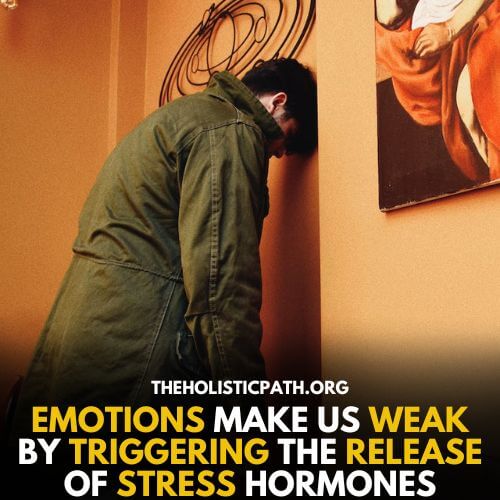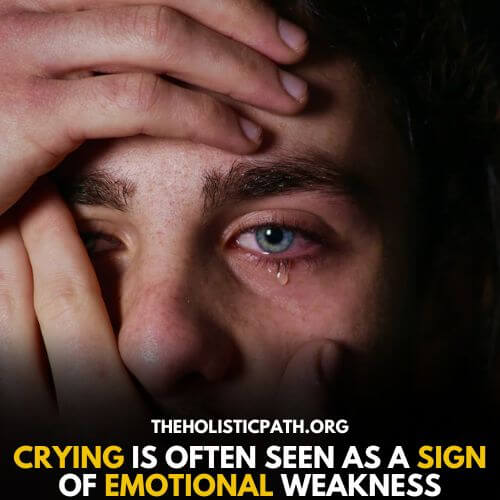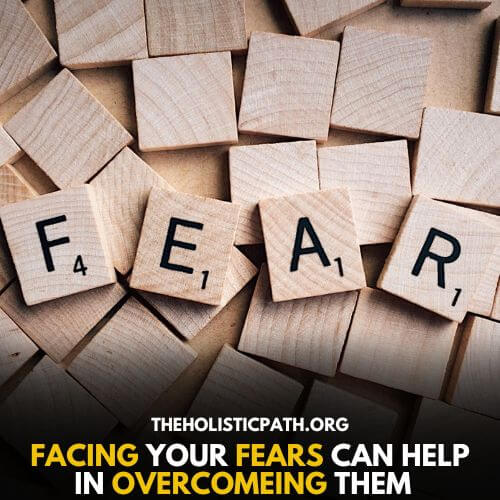While it is widely understood that emotions play a significant role in our lives, what is not as commonly known is the fact that suppressing or ignoring our emotions can actually make us weaker both mentally and physically.
In this article, we will explore the reasons why emotions make you weak and offer some tips on how to release them in a healthy way.
At some point or the other, we all have felt that emotions cloud judgment, get in the way of our thinking, and often lead to poor decisions. Then why do we need emotions in our lives?
Why Do Emotions Exist
Emotions are mental states that arise in response to stimuli, and they exist to motivate us to take action. Emotions are triggered by events or experiences that we perceive as threatening, exciting, or important.
They can be physical sensations, such as a racing heart or butterflies in your stomach, or they can be thoughts or feelings, such as fear or happiness.
Emotions provide us with important information about the world around us, and they help us to make decisions that will protect our survival and well-being.

When we see a dangerous animal in the wild, our fear triggers a physical response that prepares us to run away or fight. And when we feel happy after achieving a goal, that feeling motivates us to keep working hard so that we can continue to feel that way.
Emotions are a way for people to communicate their internal states. There are many different emotions, and each one has a different meaning.
Different Types Of Emotions And Their Role
There are many different types of emotions and they all play an important role in our lives. Some of the most common emotions are happiness, sadness, anger, and fear.
Happiness is a feeling of joy and satisfaction. It is often associated with positive events, such as getting a good grade on a test or achieving a personal goal. Happiness can also be found in everyday moments, such as spending time with loved ones or taking a walk in the park.
Sadness is a feeling of loneliness and despair. It is often associated with negative events, such as losing a job or breaking up with a partner. Sadness can also be felt in everyday moments, such as when someone you love dies or when you have to move away from your hometown.
Anger is a feeling of frustration and rage. It is often associated with negative events, such as being treated unfairly or being yelled at by someone you care about. Anger can also be felt in everyday moments, such as when you have to wait in line for a long time or when someone cuts you off in traffic.
Fear is a feeling of anxiety and terror. It is often associated with negative events, such as being attacked or getting lost in a strange city. Fear can also be felt in everyday moments, such as when you hear a loud noise outside or when you see someone walking toward you who looks dangerous.
Why Emotions Make You Weak
The reason emotions make us weak is that our brain’s limbic system becomes activated. The limbic system is responsible for our emotional responses and when it is activated, it can interfere with our ability to think clearly. This is because the limbic system creates a sense of urgency and intensity that can override our cognitive functions.
There are many reasons why emotions make us weak. One reason is that when we are emotional, our ability to think logically and rationally diminishes. This can lead to poor decision-making, which can have negative consequences for both ourselves and others.
For example, a person who is angry and emotional may make impulsive decisions such as lashing out verbally or physically at the person they are angry with, without thinking of the potential consequences.
Another reason why emotions make us weak is that they can often be accompanied by physical symptoms such as a racing heart rate, nausea, or sweating. These physical symptoms can take away our energy and make us feel tired and drained.
For instance, if you are feeling anxious, your heart may race and you may start to feel lightheaded or dizzy. This can make it difficult to concentrate on anything else or to participate in activities that require physical energy.
Another reason why emotions make us weak is that they trigger the release of stress hormones. These hormones have a number of negative effects on the body, including reducing our immunity and making us more susceptible to illness.

Additionally, stress hormones can cause us to feel anxious or panicked, which can lead to further impairment of judgment.
Finally, emotions can also make us weak because they can be contagious. When we are around other people who are emotional, it is often difficult not to get caught up in their emotionality.
For example, if you are around someone who is sad, you may start to feel sad yourself. Or if you are around someone who is angry, you may start to feel angry yourself. This can be distracting and draining, especially if the emotions being experienced are negative ones.
Emotions make us weak because they can cloud judgment and lead to bad decision-making. Like, when we’re angry we might act impulsively and say or do something we regret later. Or when we’re sad, we might withdraw from social activities and isolate ourselves, which can lead to depression.
The reason emotions make us weak is that they activate the limbic system in our brain, which is responsible for our emotional responses. This system overrides the rational part of our brain, which is responsible for logical thinking and decision-making.
As a result, our emotions can override our better judgment and lead us to make bad decisions.
Effects Of Emotional Weakness on Mind
The effect of feeling emotionally weak on the mind can be detrimental. It can lead to a decline in cognitive function, decreased productivity, and reduced problem-solving skills. Additionally, those who are emotionally weak may experience an increase in anxiety, depression, and vulnerability.
Some common symptoms of emotional weakness include:
- Feeling overwhelmed or helpless.
- Having difficulty concentrating or making decisions.
- Feeling hopeless or pessimistic about the future.
- Experiencing frequent mood swings or feelings of emptiness.
- Struggling with self-esteem issues.
- Harboring feelings of guilt or regret.
How Emotional Weakness Can Affect Our Physical Health
When someone is feeling emotionally weak, this often has a negative impact on their physical health. Some of the symptoms that may be seen include:
- Poor immune system function.
- Reduced energy levels.
- Difficulty coping with stress.
- Increased vulnerability to illness and infection.
- Irregular heart rate.
- Muscle weakness.
- Difficulty breathing.
Is Crying A Sign Of Emotional Weakness
You must have seen that for some people crying is not an option no matter how difficult the situation is. They can’t express themselves. So it might feel that one needs to be strong to cry. But for some people crying is the first option when it comes to dealing with difficult situations.
So is crying something that only strong people can do? Or is it a sign of emotional weakness?
Crying is often seen as a sign of emotional weakness. This is because crying can be seen as a way to express emotions and vulnerabilities. When someone cries, they are opening themselves up to others and showing that they need help. This can be seen as a sign of emotional weakness, as the person is not able to handle their emotions on their own.

There are several reasons why crying makes you weak. First, crying can be physically draining. When you cry, your body releases stress hormones, such as cortisol. These hormones can weaken your immune system and make you more susceptible to infection.
Crying can also cause physical pain, such as in the case of tears streaming down your eyes or chest pain from sobbing.
Second, crying can be emotionally draining. It takes energy to feel and express emotions, especially negative emotions like sadness or anger. Crying can leave you feeling exhausted and overwhelmed. This can make it difficult to cope with everyday stressors and lead to further emotional problems.
Third, crying can be socially isolating. When you cry in front of others, you may feel exposed and vulnerable. You may fear that others will judge or criticize you for your tears. This can lead to feelings of loneliness and isolation.
Overall, crying is often seen as a sign of emotional weakness because it can be physically and emotionally draining. It can leave you feeling exhausted and isolated from others. If you find yourself constantly crying, it may be helpful to seek professional help in order to address the underlying emotional issues.
14 Signs Of Emotional Weakness
- They are never assertive: People who are emotionally weak never stand up for themselves and always let others walk over them. They are always afraid to speak their mind or share their opinion for fear of being ridiculed or rejected.
- They avoid conflict at all costs: People who are emotionally weak will do anything to avoid conflict. They will go out of their way to please others and will oftentimes put their own needs and wants last.
- They have low self-esteem: People who are emotionally weak have very low self-esteem and constantly doubt their abilities and worth. They often feel like they are not good enough or that they can’t do anything right.
- They are always the victim: People who are emotionally weak constantly play the victim role in every situation. No matter what happens, they can always find a way to make it someone else’s fault.
- Their moods change constantly: People who are emotionally weak have very unstable moods. One minute they may be happy and the next minute they may be sad or angry for no apparent reason.
- They don’t have any close friends: People who are emotionally weak usually don’t have any close friends because they are too afraid to open up and let people in. They tend to stick to themselves and keep everyone at a distance.
- They’re always tired: People who are emotionally weak usually have a lot of fatigue and lack of energy. This is because they spend so much energy trying to suppress their emotions and feelings that they eventually run out of steam.
- Their body language screams “weakness”: People who are emotionally weak often give off vibes of weakness through their body language. They may appear shy, withdrawn, or submissive in order to avoid confrontation or conflict.
- They’re always apologizing: People who are emotionally weak apologize for everything, even when they don’t need to. This is another way of trying to please others and avoid confrontation or conflict at all costs.
- Everything is a drama for them: People who are emotionally weak turn everything into a drama. If something bad happens, it’s the end of the world for them. If something good happens, they celebrate it like it’s the best thing that’s ever happened to them.
- They don’t mind being average: We all might not be extraordinarily gifted. But someone who is going through an episode of emotional weakness might not see any harm in being average. They can’t seem to have the energy to struggle and do better in studies, work, or anything else. They accept them as being average.
- Being late is the only way: One of the most common signs of being emotionally weak is reaching late everywhere. When someone is feeling emotionally weak they might not want to get up and snooze the alarm again and again. Resulting in them being late.
- Quitting is the first option: More matter how difficult the task is, we don’t like quitting. But this is not the case when you are emotionally weak. Quitting becomes the first option when you don’t have the drive and are emotionally weak.
- Others can ruin the day for you: When you are not emotionally strong the simple comments or beliefs of others can ruin your day. You give people around you to overpower you.
How To Deal With Emotions That Make You Weak
1. Acknowledge the feeling:
The first step in dealing with any emotion is acknowledging that it exists. This includes recognizing that feelings of weakness are normal and okay. It’s important not to fight against or ignore these emotions, as they will only become stronger in doing so. Accepting and acknowledging the feeling of weakness will help you work through it more effectively.
2. Identify the source:
Once you’ve acknowledged the feeling, it’s important to identify its source. What is causing you to feel weak and vulnerable? Is it a specific event, situation, person, or memory? Once you know what’s triggering your feelings of weakness, you can begin to address them head-on.
3. Face your fears:
Many times, our feelings of weakness are caused by our fears and doubts. We may be afraid of failure or rejection, or we may doubt our abilities and worthiness. In order to overcome these fears, we need to face them head-on. This means taking risks and putting ourselves out there, even when we don’t feel strong or confident. The more we do this, the easier it becomes, and eventually, these fears will lose their power over us.

4. Build self-confidence:
A lack of self-confidence can often lead to feelings of weakness and vulnerability. In order to combat these feelings, it’s important to build up your self-confidence. This can be done through positive affirmations, goal setting, and practicing self-compassion. When you start to see yourself in a positive light, you will begin to feel stronger and more capable.
5. Find healthy outlets:
When we’re feeling weak and vulnerable, it can be helpful to find healthy outlets for our emotions. This might mean writing in a journal, talking to a friend, practicing yoga or meditation, or participating in an activity that brings you joy. These activities can help us process our emotions in a healthy way and make us feel stronger and more capable overall.
The Benefits Of Controlling Your Emotions
Controlling our emotions can have a lot of benefits, both in our personal and professional lives. Some of the benefits are:
- It can help us stay emotionally healthy. When we are able to control our emotions, it helps us avoid getting overwhelmed or stressed out. This can be very important in our personal lives, as it can help us maintain better relationships and avoid problems.
- It can also help us in our professional lives. When we are able to keep our emotions under control, it can make us better leaders and more effective communicators. We may also be less likely to let our emotions get in the way of our work.
- It can help us overcome emotional weaknesses. There are many times when we may struggle with our emotions, and they may get in the way of what we want to do. Controlling our emotions can help us overcome these weaknesses and reach our goals.
Overall, controlling our emotions can have a lot of benefits for both ourselves and for those around us. It can help us stay emotionally healthy and avoid problems, while also helping us overcome any emotional weaknesses we may have.
Conclusion
In conclusion, emotions make you weak because they can cloud your judgment and interfere with your ability to think logically. When you’re emotional, you’re not able to make clear decisions, and you’re more likely to act impulsively.
Additionally, strong emotions can be contagious, so if you’re around other people who are emotional, it’s difficult to stay calm and rational. In order to be effective and successful, it’s important to learn how to manage your emotions and keep them under control.
